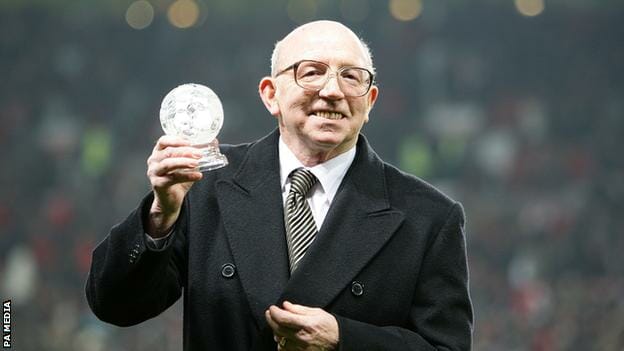

A group of 30 former footballers and their families are suing football’s governing bodies, claiming they failed to protect them from brain injuries.
The Football Associations of England and Wales and the International Football Association Board (Ifab) are accused of “failing to take reasonable action” to reduce blows to the head.
The group includes the family of 1966 World Cup winner Nobby Stiles.
Stiles, who died in 2020, had prostate cancer and advanced dementia.
His brain was diagnosed as having chronic traumatic encephalopathy (CTE) – a form of degenerative disease dementia which is believed to be caused by repeated blows.
John Stiles, Nobby’s son, said the issue of dementia in football was an “ongoing scandal”.
“These proposed legal proceedings are a part of this overall campaign for justice for the victims, like Dad, and for fundamental change in an industry that continues to cause the death and illness of thousands of players [professional and amateur, men and women] every year,” he said.
The claim alleges the football authorities have been negligent in a number of areas, including failing to reduce heading in training and during matches, failure to allow an independent doctor to assess players who suffer suspected concussion and allowing players to return to training or matches when it is unsafe to do so.
Lawyer Richard Boardman said: “The players we represent love the game. We aim to challenge the current perceptions of the sports governing bodies, to reach a point where they accept the connection between repetitive blows to the head and permanent neurological injury and to take steps to protect players and support those who are injured.
“The proposed claims in football aren’t just about financial compensation; it is also about making the game safer and ensuring current and former players get tested so that if they are suffering a brain injury, they can get the clinical help they need.”
A similar action was launched by former rugby league players last month and former rugby union players in July.
Research in 2019 showed that ex-footballers were three and a half times more likely to die of dementia than the general population.
A new dementia study was launched in April to investigate ways to reduce risk of the disease in former footballers.
New guidelines issued in July 2021 said professional footballers in England should be limited to 10 “higher force headers” a week in training from the 2021-22 season and permanent concussion substitutes were introduced in the Premier League in 2021.
The Professional Footballers’ Association renewed its calls for the introduction of temporary concussion substitutes earlier this month, saying the current protocols were “jeopardising player safety”.
A temporary concussion substitute would allow time for a player suspected of having concussion to be properly assessed while the match continues without a team having a numerical disadvantage. The player could then return to the match if deemed fit to continue.
BBC Sport has contacted The FA, FAW and IFAB for comment.







